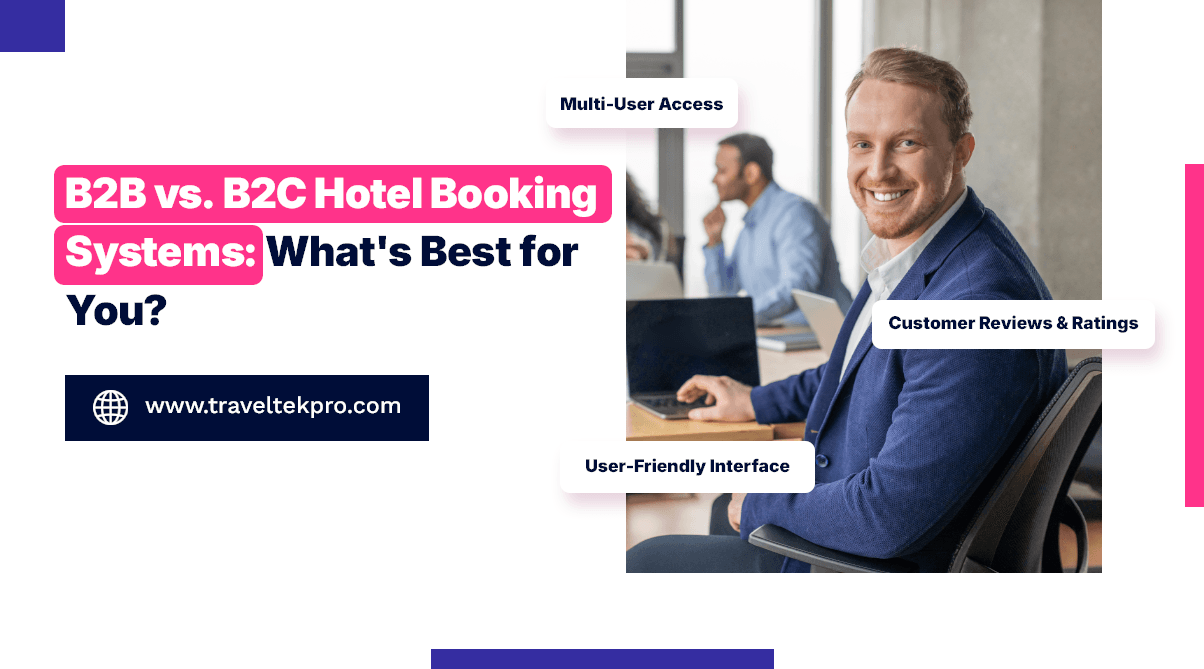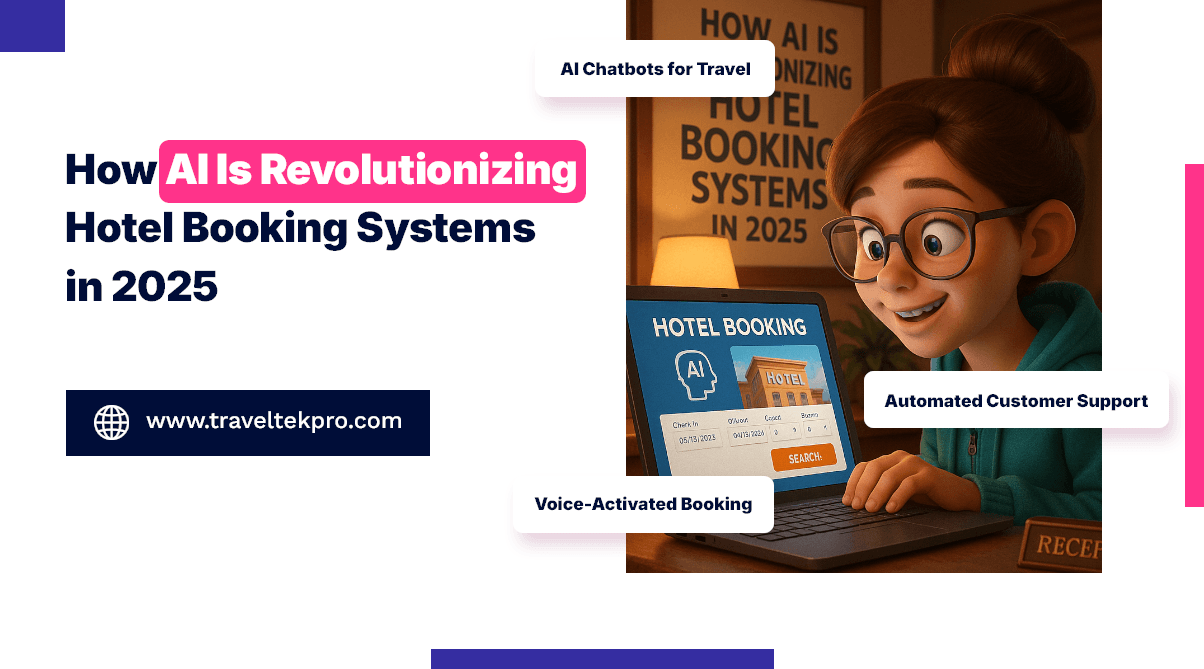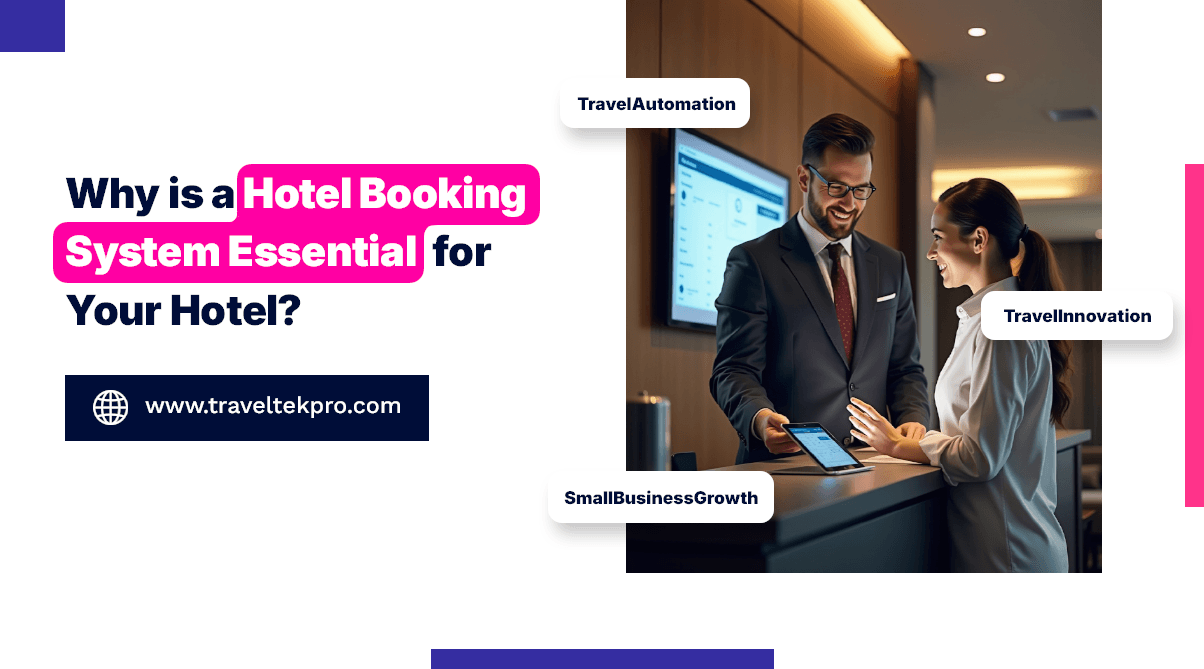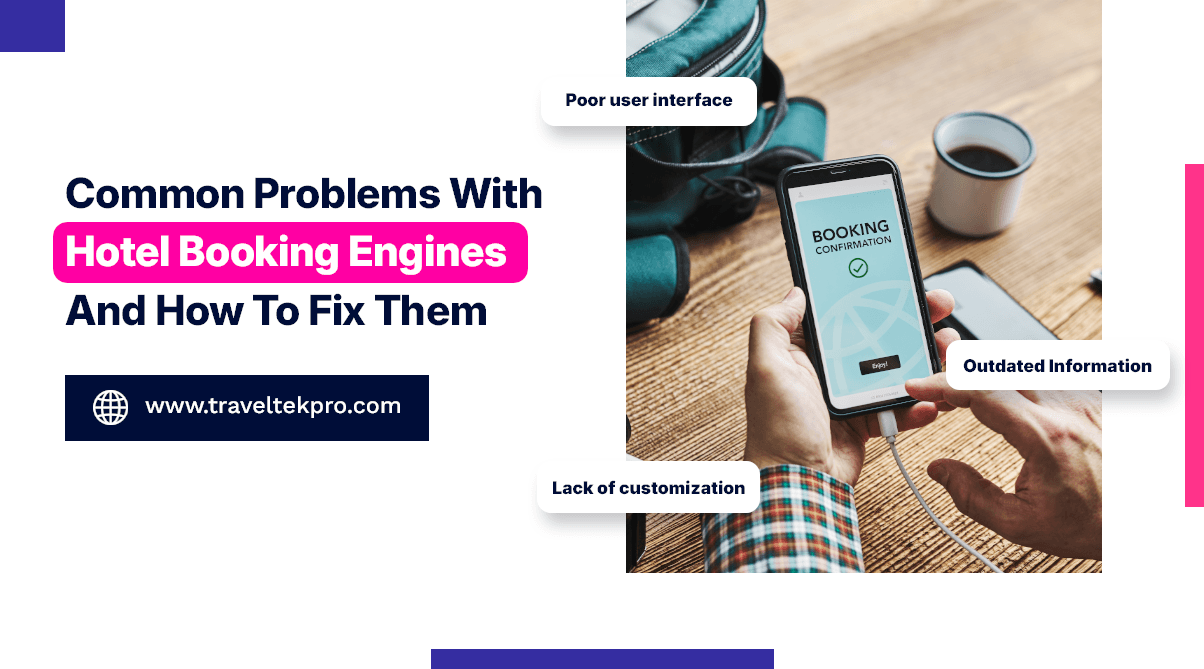B2B vs. B2C Hotel Booking Systems: What’s Best for You?
If you have ever tried to book a hotel, you know it’s not as easy as it looks. In fact, it can be downright frustrating when things don’t work smoothly. Whether you are planning a quick weekend getaway or business trip, or a family vacation, you truly want everything to work right behind the scenes. There is a lot happening to make that booking happen, and for hoteliers, travel agencies and tour operators, the hotel booking system they use absolutely is key to success. In 2025 and the way people book hotels has changed completely. So, whether you are a hotel manager or travel agent, or just anyone in the travel industry, choosing the right hotel booking engine can make a big difference.
What do you need to know about the Hotel Booking System, and why does it matter?
In simple terms, Hotel Booking Software is actually a technology that allows your customers to search for hotels, check availability and make reservations online. But there is a lot more to it than just that. For hotel managers or online travel agencies, a good booking system is the heart of the business. It’s the tool that handles your room availability pricing management, payments and invoicing, guest preferences and analytics to help improve marketing and sales strategies. At the back of your mind, you might be wondering why this matters so much. Well, think about it, today’s travellers expect a seamless, easy booking experience. If they can’t find what they want or if the system is challenging to use, they’ll just bounce to the next website. It’s really simple.
On the flip side, if you are a hotel owner or an agency, a good system can save a lot of time by automating the process. It helps you stay competitive in the crowded market. It gives you insights into how your business is performing so you can make better decisions.
B2B vs B2C
You’ve probably heard the terms thrown around, but what do they actually mean when it comes to booking systems? B2B hotel booking engine is used by businesses like travel agencies corporations and wholesalers. The systems are designed for people like you who book multiple rooms at once or handle group bookings, more conferences towards or corporate travel. If you are running a travel agency or a business that books hotels for clients, or B2B system is what you actually need.
You can book multiple rooms at once which is super handy if you’re a tour operator or a event planner. The systems often allow you to set special rates are markups for agencies. Agents or sub agents can log in and make bookings for the clients all from the same system. For example if you are an agency organizing a group tour of Paris. You need a system that can handle multiple rooms for the group’s special pricing for the agency and allow for easy payments across several bookings. That’s where B2B systems come into the picture.
B2C booking systems
On the flip side B2C Hotel Booking System it’s perfect for individual travellers who book directly with hotels or through OTAS. Think about the last time you booked a hotel directly on our website or through a platform. That’s a B2C booking system at work. You can see exactly what’s available when you want it. There is no more calling hotels or waiting for confirmation. With B2C systems, you can expect to book the stay instantly without any delays. Several B2C systems include features that help hotels reward guests, like loyalty programs or discounts for repeat visitors. If you are a hotel that caters to individual travelers, having a system that lets you book directly through your website is very important. It cuts down on commissions that you would pay to OTAS and gives you direct contact with your clients.
Read More: 7 Benefits of Using a Modern Hotel Booking System in 2025?
Are hybrid systems the best of both worlds?
OK, so the cool part here is the hybrid Hotel Booking Software. It is becoming really prominent. The systems combine the features of both B2B and B2C systems so they can serve individual customers and business clients at the same time. If you are business that needs to cater to both individual customers and business clients, are hybrid system is just perfect for you. It makes it very easy for you to handle bulk bookings from agencies and also allows individual travelers to book rooms easily. You can manage everything from room availability to pricing in one system.
For example, if you are running a hotel again, you might have travel agencies booking in bulk for corporate events, but you also want to make it easy for individual tourists to book directly.
Regional trends
Booking trends can vary a lot depending on where you are.
- USA
In the US, mobile bookings are truly the king. A lot of people are using their phones to book rooms on the go, and they want the process to be quick and easy. Loyalty programs are also a very big deal, as a lot of people prefer to book directly with hotels for the rewards. You can expect quick and easy mobile interfaces, loyalty reward programs, and instant booking.
- UAE and the Middle East
In the UAE and the Middle East, many hotels cater to the luxury market, so your booking system needs to reflect the same. Travellers here expect customised service, and hotels often want to offer premium payment options. So you need to provide support for multilingual booking and integration with luxury, considerate services.
- Europe’s
Europeans are likely to be more cautious about privacy and data security. So your system needs to be compiled with the general data protection regulation. The best part is that there are no hidden fees. There is just clear pricing, full transparency, and GDPR compliance.
Key features to look for in a hotel booking system
As you know, the different types of booking systems and the regional trends, it’s very important for you to check out the must-have features.
1. Mobile-friendly design
With so many people booking on the phones, your system should be fully responsive on mobile devices. Your guests should be able to book rooms, check in, and manage the reservations on the go.
2. Real-time availability
Nothing is more frustrating as compared to booking a hotel only to find out it’s already full. Real-time availability is very important to keep things running smoothly.
3. Multiple payment options
Your guests want options when paying for their stays. Whether it’s a credit card, PayPal, or even cryptocurrency, your hotel booking engine should make payment easy for everyone.
4. Multilingual and multi-currency support
If you are dealing with international customers you need to make sure that your Hotel Booking System supports multiple languages and currencies. This will help you cater to travelers from different parts of the world.
5. Analytics and reporting
A solid admin dashboard will make it very easy for you to track your booking see which rooms are most popular and even get insights into your marketing efforts. These reports are invaluable if you want to improve your business.
How to choose the right booking system?
Now that you know a lot about Hotel Booking Software you might be wondering how do you choose the right system for your business? If you are mainly dealing with agencies or corporate clients go for B2B system. If you are just focused on individual travelers B2C system is your best bet.
If you need both hybrid system is truly your way to go. Look at the habits of your customers based on the location do they want mobile booking or multilingual support?
So choosing the right hotel booking system is not just about software it’s all about making the guest experience better while also streamlining our operations. Whether you are booking a business trip or managing a group travel your system should work seamlessly for everyone. If you’re ready to find a solution that just fits your business reach out to experts at Traveltekpro.
Read More: Top 10 Travel Booking Systems for Travel Agencies
FAQ’S
1. What is a hotel booking engine?
Hotel booking software is a comprehensive technological solution designed to automate and optimize the entire reservation lifecycle for hospitality businesses, encompassing inventory management, rate distribution, guest data processing, and multi-channel integration. This sophisticated software serves as the operational backbone for modern hotels, enabling real-time synchronization of room availability across all distribution channels—including direct website bookings, online travel agencies (OTAs), global distribution systems (GDS), and metasearch platforms—while simultaneously managing complex pricing strategies and promotional campaigns. Unlike standalone booking engines that focus primarily on direct reservations, advanced hotel booking software integrates critical functionalities such as property management system (PMS) interoperability, channel manager capabilities, and revenue optimization tools, creating a unified ecosystem that reduces operational silos and improves data accuracy across departments. Industry data indicates that properties implementing robust booking software experience an average 35% reduction in manual administrative tasks, while achieving 18% higher revenue per available room (RevPAR) through dynamic pricing algorithms and demand forecasting features.
2. What is the difference between B2B and B2C booking systems?
B2B (Business-to-Business) and B2C (Business-to-Consumer) booking systems fundamentally differ in their core architecture, target audience, and operational capabilities to serve distinct business requirements within the travel ecosystem. B2B travel software is specifically engineered for travel agencies, tour operators, and corporate travel departments, facilitating complex bulk bookings for multiple clients with sophisticated pricing models incorporating net rates, commissions, and custom pricing structures, while integrating with an average of 27 different supply sources compared to just 8 for typical B2C platforms. In contrast, B2C travel software targets individual travelers directly with intuitive interfaces optimized for single-user bookings, transparent pricing, personalized recommendations, and streamlined loyalty programs, with research indicating that 67% of travelers now prefer booking through these platforms while mobile bookings have increased by 28% year over year. The operational distinctions extend to payment processing (with B2B offering invoice-based systems and corporate credit options versus B2C’s immediate payment collection), inventory management (B2B handling large cross-supplier inventories versus B2C’s simplified options), and reporting capabilities (B2B providing detailed commission and revenue analysis versus B2C’s focus on user behavior metrics)—differences that directly impact how businesses interact with the software and the customer experience they can deliver. According to industry research, 84% of corporate travel managers consider efficient booking systems critical to their operations, while 73% of travel management companies require highly customizable software solutions to effectively serve corporate clients with diverse policy requirements, highlighting why understanding these distinctions is essential for selecting the appropriate technology solution.
3. Which booking system is better for you if you’re a hotel chain or OTA?
The optimal booking system selection for hotel chains and Online Travel Agencies (OTAs) depends critically on business model complexity, target market segments, service offerings, and long-term strategic objectives, with hybrid solutions often providing the most comprehensive value by integrating both B2B and B2C capabilities within a unified platform architecture. Hotel chains managing multiple properties benefit tremendously from Multi-Property Booking Engine functionality that enables guests to seamlessly book accommodations across various locations without navigating away from the brand website, while simultaneously providing centralized administration tools for managing chain-wide inventory, rate structures, loyalty programs, and promotional campaigns—capabilities that directly contribute to commission-free direct bookings and enhanced brand consistency. For OTAs, the decision hinges on their specific business focus: those primarily serving individual travelers should prioritize B2C platforms with exceptional user experience design and personalization features (valued by 82% of travelers), while those targeting corporate clients would benefit from robust B2B systems with the policy compliance tools and commission management functionalities prioritized by 91% of travel managers. Research demonstrates that implementing the right booking technology can deliver significant financial benefits, with B2B travel bookings managed through specialized systems averaging 22% higher savings through negotiated rates compared to standard B2C booking channels—a compelling advantage for businesses seeking to optimize their operational efficiency while delivering superior customer experiences in an increasingly competitive digital marketplace.
4. Which is better for my hotel B2B, B2C, or hybrid booking system?
Choosing between B2B, B2C, or hybrid booking engines depends on your clientele: B2B systems are built for agencies and corporate clients needing bulk bookings, commissions, and agent portals; B2C systems cater to direct consumers with mobile-friendly UIs, loyalty programs, and instant booking; hybrid systems combine both, letting you serve both markets seamlessly so pick your model based on whether you target agents, individuals, or both.
5. What essential features should a hotel booking system have in 2025?
A modern hotel booking engine should deliver mobile responsiveness, real-time availability, multiple secure payment methods, multilingual and multi-currency support, and robust analytics; these capabilities ensure guests can book from any device, pay easily, navigate in their language, and give hoteliers actionable insights to improve occupancy and revenue.
6. How do regional booking trends impact engine choice?
Regional guest behaviors shape booking system needs: U.S. travelers expect fast mobile booking and strong loyalty perks; Middle Eastern users value multilingual support, luxury experiences, and premium payments; European travelers demand GDPR compliance, transparent pricing, and data security so your engine should align its features with your target region’s booking habits and expectations.
Let's Start Your Project
Let us help you achieve your goals, by creating the best solution for you!




